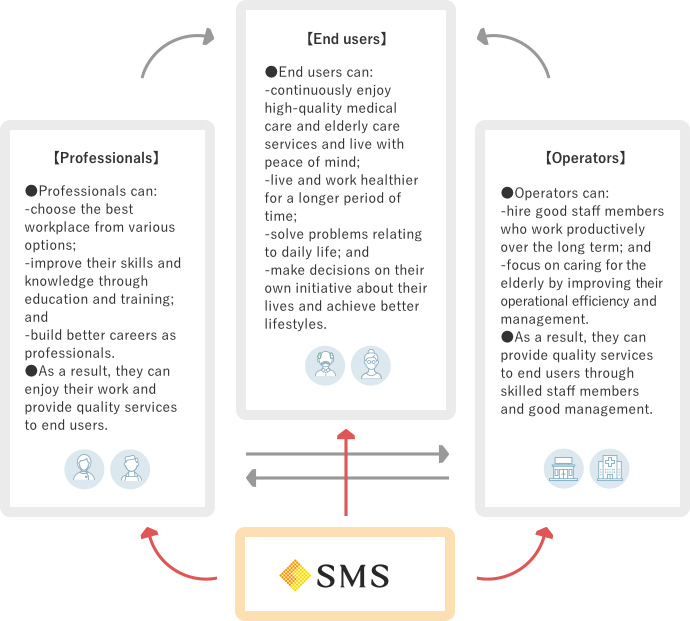What we aim to realize
SMS's Mission is “to improve the quality of life by providing information infrastructure for an aging society.” Here's what we are all about - how we perceive the situation and changes in society, the issues arising from them, how we solve these issues, and what we are aiming to realize.
An unprecedented era of low birth rate, aging and population decline
Japan is entering an era of simultaneous rapid aging and population decline, the likes of which no one has ever experienced. As of 2020, the number of elderly people aged 65 and over has reached 36.17 million. The aging rate, which already exceeds 25%, is expected to reach approximately 35% by 2040 when the elderly population approaches its peak of over 39 million. On the other hand, the working-age population aged 15–64, who play a central role in economic activities, continues to drop, and its relative percentage of the population composition is projected to decline from 68% in 2000 to nearly 55% by 2040.
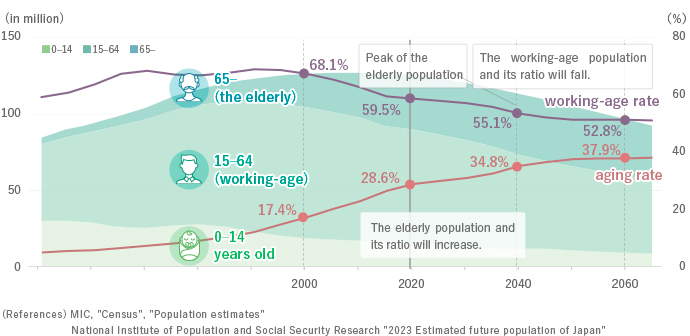
Three critical issues faced by an aging society
Against the backdrop of these demographic changes, the state of society, including economic trends, national policies, and people's values, has undergone significant changes, and new issues have emerged that did not exist before. We recognize that there are three important social issues that we need to solve in an aging society.
●Issue 1: Difficulty in sustaining high-quality medical care and elderly care services
While the demand for medical care and elderly care services is increasing as the population ages, the shortage of workers to support these services has become a serious problem due to a decline in the working-age population. According to national estimates, the supply and demand gap of medical care and elderly care workers is expected to expand to between 60,000 to 270,000 nurses and 220,000 care workers in 2025. The growing shortage of medical care and elderly care professionals will make it difficult to sustain high-quality medical care and elderly care services.

●Issue 2: More severe burden on the working generation
As the elderly population increases, social security expenses that support pensions, medical care, and elderly care are expected to increase to 170 trillion yen in 2040, about 1.6 times the current level. On the other hand, due to the decline in the working-age population, we will see shrinking workforces, not only in medical care and elderly care, but in all industries in Japan. The average number of people in the working generation required to support one elderly person is expected to decline from 2.1 in 2018 to 1.6 in 2040, placing an increasingly heavy burden on the working generation.
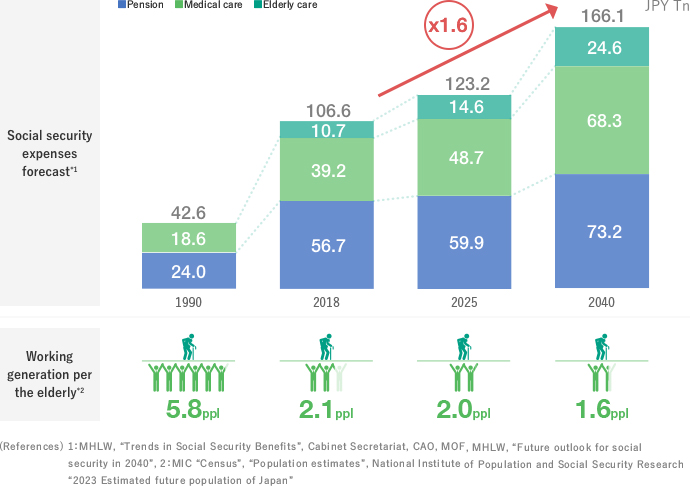
●Issue 3: Difficulty in solving problems related to living in the aging society
As the population ages, the services required in society are also changing. In an aging society, new needs such as elderly care and end-of-life planning are emerging and the demand for these services is expanding. However, the available information related to living in an aging society is insufficient in terms of quality and quantity, and it is not provided in an organized manner. Furthermore, there are also concerns that the future labor shortage in many industries will result in an inability to adequately supply the services required by an aging society. This will make it difficult for the elderly and their families to solve various life-related problems.
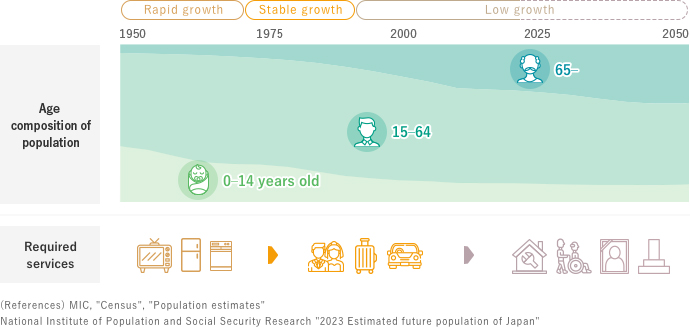
We would like to solve these three social issues in Japan’s aging society through the realization of our Mission.
We aim to improve people’s quality of life by providing information infrastructure for an aging society.
■Business domains in an aging society
We define our business domains in an aging society as Medical Care, Elderly Care, Healthcare, and Senior Life.

■Information Infrastructure
We define information infrastructure as a platform to connect those to whom we provide value: end users such as patients, the elderly, and their families; professionals such as nurses and elderly care workers; and business operators such as hospitals and elderly care operators.
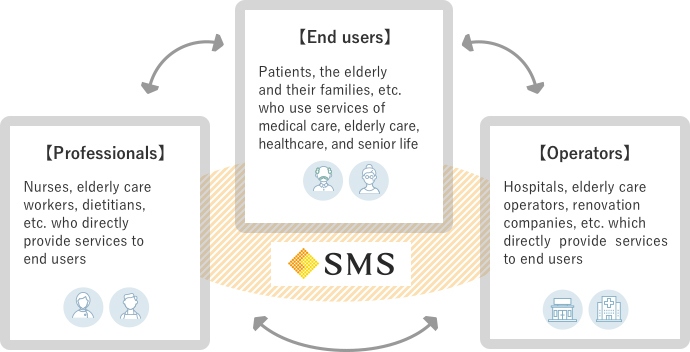
■Business areas
We set our business areas based on the four domains required for an aging society and the three stakeholders to which we provide value through information infrastructure.
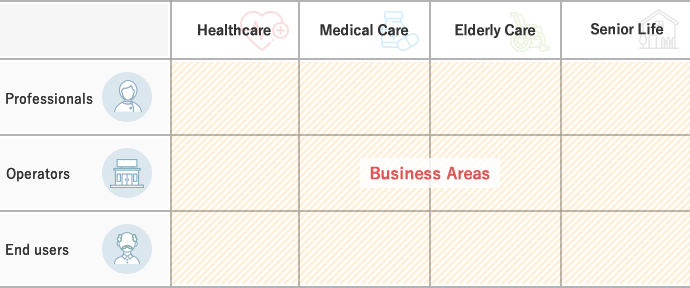
Issues in Japan's aging society and our solutions
In order to solve the three issues facing Japan’s aging society through building information infrastructure, we have established specific solutions targeting each social issue.
For Issue 1: difficulty in sustaining high-quality medical care and elderly care services, in addition to solving the overwhelming supply-demand gap of medical care and elderly care professionals, it is important to improve the operational efficiency and solve management issues of business operators that provide medical care and elderly care services. Therefore, we believe that the solution is to "solve labor shortages and uneven distribution of medical care and elderly care professionals" and to "improve the management of medical care and elderly care operators."
For Issue 2: more severe burden on the working generation, resulting from increasing social security costs and a decreasing working-age population, we will be able to solve this issue through "increasing the number of healthy people in the work force" by enabling more people to work productively in good health for a long period of time.
For Issue 3: difficulty in solving problems about life in the aging society, our solution is to "provide a variety of options and high-quality decision-making information" by organizing various types of information related to Japan's aging society in an easy-to-understand manner.
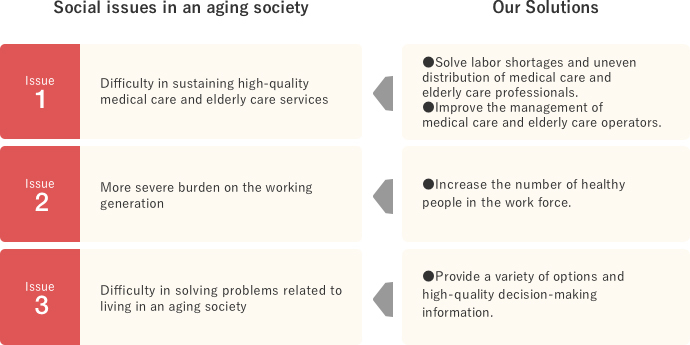
Four strategic business areas
We define our four strategic business areas based on these approaches.
Specifically, we aim to solve the three social issues by building information infrastructure in the following areas.
- - Career Business: aiming to solve labor shortages and uneven workforce distribution of medical care and elderly care professionals.
- - Elderly Care Operators Business (Kaipoke): contributing to improving the management and the service quality of elderly care operators.
- - Healthcare Business: aiming to prevent and treat lifestyle-related diseases and mental disorders.
- - Senior Life Business: offering a wide range of choices and information related to living in Japan’s aging society.
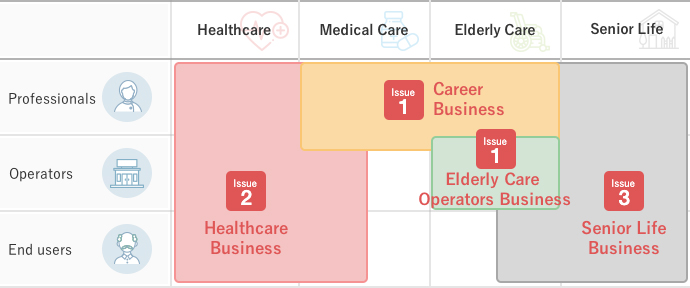
The realization of better lives for people living in Japan's aging society
We aim to contribute to improving the lives of people in Japan's aging society by realizing our Mission and solving the three social issues.
In the fields of medical care and elderly care, supporting care professionals in improving work styles, improving their skills, and developing their careers, and supporting business operators in realizing better management will enable professionals and operators to provide better services to the elderly and patients. In the end, this will lead to a more secure and vibrant life for the elderly, patients, and their families.
Providing services that help prevent and treat lifestyle-related diseases and mental disorders will enable the working generation to work healthily for a long period of time. In addition, providing the elderly and their families with high-quality options will enable people to solve their life-related worries or problems, make satisfactory decisions in various life situations, and lead better lives.
By building information infrastructure suitable for Japan’s aging society, we will continue to provide direct value to end users such as the elderly, patients, their families, and the working generation, as well as indirect value to medical care and elderly care professionals and to operators that provide various services. And this will definitely lead to improvements in the quality of life for people living in Japan’s aging society.
